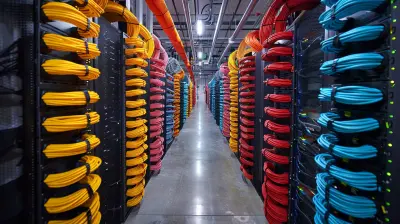Blockchain and the Evolution of Digital Advertising
2 June 2025
Digital advertising is constantly evolving, and over the years, we've seen this industry take massive leaps. From the early days of banner ads to the sophisticated algorithms that power today’s targeted campaigns, the way brands reach consumers has changed dramatically. But amidst all these advancements, a new player has entered the game that promises to shake things up even more: blockchain.
Now, before you slouch back thinking this is just another buzzword, hold tight. Blockchain isn't just about cryptocurrencies like Bitcoin or Ethereum. Its applications are far-reaching, and one of the most exciting areas where blockchain is making waves is in digital advertising. Buckle up, because we're diving into how blockchain is revolutionizing the digital ad space, and trust me, it’s going to be a wild ride.

What is Blockchain, Anyway?
Alright, let’s start with the basics. While some of you might already be blockchain experts, others might still be scratching their heads at the term. So, what exactly is blockchain?Simply put, blockchain is a decentralized ledger technology. Picture it like a chain of blocks, but instead of just being regular ol' blocks, each one contains a batch of information. Every time new data is added, it's timestamped, verified by multiple computers (called nodes), and then linked to the previous block. Because this system is decentralized—there’s no single entity controlling it—blockchain is incredibly secure and transparent.
Now, you're probably thinking: "Okay, but what does that have to do with advertising?" Let’s break it down.

How Digital Advertising Works Today
Before we jump into how blockchain can change things, it’s essential to understand how digital advertising works today. Right now, digital ads are largely controlled by a few big players, particularly Google and Facebook. These tech giants act as middlemen between advertisers and consumers.Here’s the catch: the process isn’t as transparent as it seems. Advertisers often don’t know where their money is going, and consumers are bombarded with ads that may or may not be relevant to them. Plus, issues like fraud, click farms, and ad blocking are rampant, which means billions of dollars are lost every year in inefficiencies.
So yeah, the digital advertising space is far from perfect. That’s where blockchain steps in like a superhero ready to save the day.

The Role of Blockchain in Digital Advertising
1. Transparency in Ad Spending
One of the biggest challenges advertisers face today is knowing where their ad dollars are going. It’s like throwing money into a black hole and hoping for the best. But blockchain can change that.With blockchain, every transaction is recorded on an open ledger, meaning advertisers can track exactly where their money is being spent. They can see which publishers are displaying their ads, how much they’re paying for those placements, and even if the ads are reaching real people or bots.
For example, blockchain can verify that an ad was actually shown to a user and not some random bot designed to generate fake clicks. This increased transparency ensures advertisers get a better bang for their buck, and it reduces the chances of money being wasted on fraudulent activities.
2. Fighting Ad Fraud
Ad fraud is a huge issue in the world of digital marketing. In fact, it’s estimated that ad fraud could cost businesses over $100 billion by 2023. That’s a lot of wasted cash!Blockchain can serve as a powerful tool to combat this. Here’s how: Since blockchain is decentralized and tamper-proof, it becomes nearly impossible for fraudsters to manipulate data. Blockchain verifies every step of the ad delivery process, ensuring that impressions, clicks, and conversions are all coming from legitimate sources.
Think of it like putting a digital lock on every ad transaction. Fraudsters can try to crack that lock, but with blockchain in place, their chances of success plummet.
3. Decentralized Ad Platforms
Right now, big players like Google and Facebook dominate the digital advertising landscape. But blockchain could pave the way for decentralized ad platforms, cutting out these middlemen entirely.On a decentralized platform, advertisers can connect directly with publishers and consumers. It’s like cutting out the middleman when you buy directly from a farmer instead of a grocery store. This direct connection reduces costs and increases efficiency. Plus, it gives both advertisers and publishers more control over their campaigns.
Imagine a world where small businesses can run effective ad campaigns without having to pay hefty fees to tech giants. That’s the kind of potential blockchain brings to the table.
4. Better Targeting and Data Privacy
We’ve all had that creepy moment where we search for a product online, and then suddenly, we’re seeing ads for that product everywhere—on Facebook, Instagram, even our email inbox. While targeted ads can be useful, they can also feel intrusive, especially when companies are collecting massive amounts of personal data.With blockchain, the balance between effective targeting and data privacy can be restored. Instead of companies storing massive amounts of personal data on centralized servers, consumers could control their own data and choose who gets access to it.
Smart contracts, a feature of many blockchain systems, could be used to ensure that advertisers only get access to the data that consumers explicitly allow. This way, users have more control over their privacy, and advertisers still get the information they need to deliver relevant ads.
5. Rewarding Consumers for Their Attention
Let’s be honest: most of us don’t enjoy being bombarded by ads. But what if we were actually compensated for our time and attention? Sounds like a win-win, right?Blockchain can enable advertisers to reward consumers directly for engaging with ads. Platforms like Brave Browser and its associated Basic Attention Token (BAT) are already doing this. Users earn tokens for viewing ads, which they can then redeem for various rewards.
This system creates a more equitable ecosystem where consumers are no longer passive participants in the ad experience—they’re active stakeholders. It’s like getting paid for watching TV commercials, but without the annoyance.

Challenges and Limitations
Of course, while blockchain offers some exciting opportunities for digital advertising, it’s not without its challenges. Let’s not get too ahead of ourselves.1. Scalability Issues
Blockchain technology, while secure and transparent, is still in its early stages. One of the biggest hurdles it faces is scalability. Processing large amounts of transactions on a blockchain network can be slow and costly. In the fast-paced world of digital advertising, delays and high fees could be deal-breakers.However, advancements in blockchain technology (such as Layer 2 solutions) are being developed to tackle these issues. So, while scalability is a challenge now, it’s not necessarily a permanent roadblock.
2. Adoption Barriers
For blockchain to truly revolutionize digital advertising, there needs to be widespread adoption. And let’s face it: not everyone’s ready to jump on the blockchain bandwagon just yet. Many advertisers and publishers are still unfamiliar with the technology, and some might be resistant to change.That said, as more companies recognize the potential benefits of blockchain, we’re likely to see adoption rates increase over time. It’s not a matter of if, but when.
3. Regulatory Concerns
Finally, there’s the issue of regulation. Governments around the world are still figuring out how to regulate blockchain and cryptocurrencies. Uncertainty in this area could slow down the adoption of blockchain in advertising.However, as regulatory frameworks become clearer, this challenge could become less of an issue. It’s just another hurdle for blockchain to overcome on its journey to mainstream adoption.
A Glimpse into the Future
So, what does the future hold for digital advertising and blockchain? While it’s impossible to predict with 100% accuracy, one thing is clear: blockchain has the potential to bring about massive changes in the way we think about online ads.Picture a world where advertisers can track every dollar they spend, where fraud is a thing of the past, and where users are in control of their own data. Imagine decentralized platforms that give power back to the people and reward consumers for their attention. It’s not a far-off fantasy—it’s a future that blockchain could help bring to life.
Of course, there are still hurdles to overcome, but the potential is undeniable. The digital advertising landscape is ripe for disruption, and blockchain might just be the technology that does it.
Conclusion
At the end of the day, blockchain represents a new frontier for digital advertising. It promises to solve some of the industry’s most pressing issues, from fraud and privacy concerns to transparency and inefficiency. While challenges remain, the possibilities are exciting—and we’re just beginning to scratch the surface.So, whether you’re an advertiser, a publisher, or just someone tired of seeing irrelevant ads, keep an eye on blockchain. It’s going to be a game-changer.
all images in this post were generated using AI tools
Category:
Blockchain TechnologyAuthor:

Reese McQuillan
Discussion
rate this article
3 comments
Nico Edwards
Great insights! It’s fascinating to see how blockchain can revolutionize digital advertising, enhancing transparency and trust in an ever-changing landscape. Keep it coming!
June 13, 2025 at 3:22 AM

Reese McQuillan
Thank you! I'm glad you found the insights valuable. Exciting times ahead for blockchain in digital advertising!
Owyn Wade
Blockchain's transparency and security could revolutionize digital advertising, enhancing trust between advertisers and consumers while reducing fraud and inefficiencies.
June 5, 2025 at 4:52 AM

Reese McQuillan
Absolutely! Blockchain can indeed enhance transparency and security in digital advertising, fostering trust and significantly minimizing fraud and inefficiencies.
Sara Gonzalez
Exciting journey ahead—let's revolutionize advertising together!
June 4, 2025 at 10:41 AM

Reese McQuillan
Absolutely! Together, we can drive innovation and reshape the future of advertising with blockchain technology.



